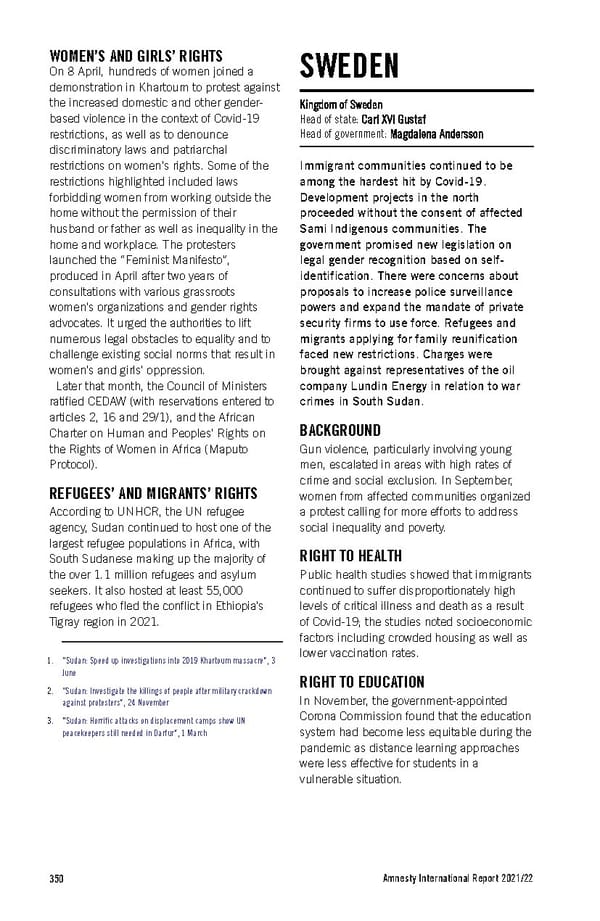WOMEN’S AND GIRLS’ RIGHTS On 8 April, hundreds of women joined a SWEDEN demonstration in Khartoum to protest against the increased domestic and other gender- Kingdom of Sweden based violence in the context of Covid-19 Head of state: Carl XVI Gustaf restrictions, as well as to denounce Head of government: Magdalena Andersson discriminatory laws and patriarchal restrictions on women’s rights. Some of the Immigrant communities continued to be restrictions highlighted included laws among the hardest hit by Covid-19. forbidding women from working outside the Development projects in the north home without the permission of their proceeded without the consent of affected husband or father as well as inequality in the Sami Indigenous communities. The home and workplace. The protesters government promised new legislation on launched the “Feminist Manifesto”, legal gender recognition based on self- produced in April after two years of identification. There were concerns about consultations with various grassroots proposals to increase police surveillance women’s organizations and gender rights powers and expand the mandate of private advocates. It urged the authorities to lift security firms to use force. Refugees and numerous legal obstacles to equality and to migrants applying for family reunification challenge existing social norms that result in faced new restrictions. Charges were women’s and girls’ oppression. brought against representatives of the oil Later that month, the Council of Ministers company Lundin Energy in relation to war ratified CEDAW (with reservations entered to crimes in South Sudan. articles 2, 16 and 29/1), and the African BACKGROUND Charter on Human and Peoples’ Rights on the Rights of Women in Africa (Maputo Gun violence, particularly involving young Protocol). men, escalated in areas with high rates of crime and social exclusion. In September, REFUGEES’ AND MIGRANTS’ RIGHTS women from affected communities organized According to UNHCR, the UN refugee a protest calling for more efforts to address agency, Sudan continued to host one of the social inequality and poverty. largest refugee populations in Africa, with RIGHT TO HEALTH South Sudanese making up the majority of the over 1.1 million refugees and asylum Public health studies showed that immigrants seekers. It also hosted at least 55,000 continued to suffer disproportionately high refugees who fled the conflict in Ethiopia’s levels of critical illness and death as a result Tigray region in 2021. of Covid-19; the studies noted socioeconomic factors including crowded housing as well as 1. “Sudan: Speed up investigations into 2019 Khartoum massacre”, 3 lower vaccination rates. June RIGHT TO EDUCATION 2. “Sudan: Investigate the killings of people after military crackdown In November, the government-appointed against protesters”, 24 November 3. “Sudan: Horrific attacks on displacement camps show UN Corona Commission found that the education system had become less equitable during the peacekeepers still needed in Darfur”, 1 March pandemic as distance learning approaches were less effective for students in a vulnerable situation. Amnesty International Report 2021/22 350
 Amnesty International Report 2021/22 Page 349 Page 351
Amnesty International Report 2021/22 Page 349 Page 351